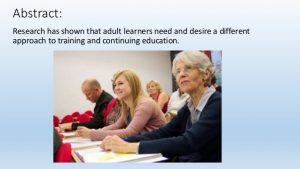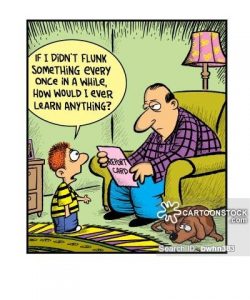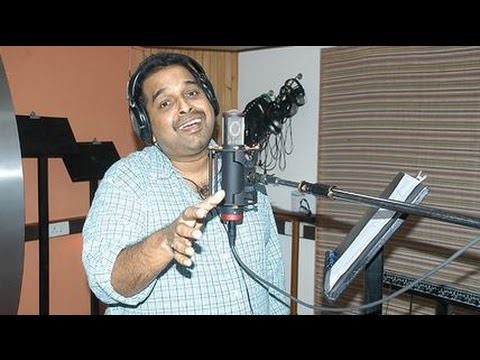Live your life by accelerating your learning curve
 Learning curve is defined as ‘the rate of a person’s progress in gaining experience or new skills. It can be presented in graphical representation of the common sense principle that the more one does something the better by putting in headwork; one gets better and better at it. Learning curves are geometric curves that can be graphed on the basis of a formula. In business organizations when people are hired the learning curve is measured on the basis of their output. Typically, the X (horizontal) axis measures cumulative output and the Y (vertical) axis measures the cost per unit. The curve starts with a high cost per unit at the beginning of output, decreases quickly at first, and then levels out as cumulative output increases. The slope of the learning curve is an indication of the rate at which an employee’s learning transforms into cost savings.
Learning curve is defined as ‘the rate of a person’s progress in gaining experience or new skills. It can be presented in graphical representation of the common sense principle that the more one does something the better by putting in headwork; one gets better and better at it. Learning curves are geometric curves that can be graphed on the basis of a formula. In business organizations when people are hired the learning curve is measured on the basis of their output. Typically, the X (horizontal) axis measures cumulative output and the Y (vertical) axis measures the cost per unit. The curve starts with a high cost per unit at the beginning of output, decreases quickly at first, and then levels out as cumulative output increases. The slope of the learning curve is an indication of the rate at which an employee’s learning transforms into cost savings.
One can explain the shape of learning curve in a different way. When a new task or production operation begins, a person or system learns quickly, and the learning curve is steep. With each additional repetition, less learning occurs and the curve flattens out. At the beginning of production or learning, individuals or systems are said to be “high” on the learning curve. That means that costs per unit are high, and cumulative output is low. Individuals and systems “move down” the experience or learning curve by learning to complete repetitive tasks more efficiently, removing hesitation and mistakes, mechanizing certain tasks, and making adjustments to procedures or systems.
People’s learning happens sporadically sometimes or not all such that they cannot be graphed. But that’s exactly what you should do. The phrase, of course, has spread from management science to business and other activities generally. In the broader frame “learning curve” has come to mean that every new activity requires the acquisition of knowledge and skill. It takes time and requires money to master new jobs and new fields, but later knowledge provides efficiency and leverage.
In an average case, one follows the common path; he/she gains education in a structured setting and uses the knowledge as the basis for a career. If an individual continues to learn ahead, advancement by gaining further education he/she grows. Career advancement is a byproduct of a person’s experience. That’s important too. Learning curve grows by unlearning what we have learnt. In most areas of learning, there is always a “next step” with data or content one consumes because constantly things keep changing.
We all need to apprehend that we know nothing. Only when we realize this, our mind gets ready for accelerated learning. When we think we know all or that we have answers for all problems we become unreceptive. Therefore, approaching situations with the mindset that we know nothing is better as we then learn objectively and stop thinking subjectively. And an objective, measured mindset is necessary for learning. Unlearning what we have learnt is very important for learning new things. In sense, we learn same topics
I am of an opinion that often the challenges we face come as blessings in disguise. If you look at them closely, they have some opportunities hidden in them. Life’s challenges usually seem like inconveniences because they disrupt our schedules, or get in the way of something we want to do. But, those challenges accelerate our learning curve. Similarly, when we are working on an important assignment, the last thing we want is to face big, unexpected challenges or obstacles. When that happens, it usually means a major delay. But, we forget to look at our added learning curve; we instead look at greater expense, or some other unplanned complication. When we are focused on results it is hard to appreciate the detours caused by new challenges.
It is rightly said that failing in a class or two in school strengthens our learning curve. We need to look at each problem/challenge in a whole new light. What if we could learn to see them as highly beneficial experiences, adventures in learning are interpreted as learning experience. The truth is, with the right mental attitude we can completely reframe the way we experience challenges. And changing our self talk positively with the right questions is one of the most effective ways to do that. With a little practice we can view the challenges as some of our most valuable life experiences.
There are few things in life which help us accelerate our learning curve. They are:
Keep learning: You need to learn while at work from others and learn on your own many new things. In your personal life you can experiment with cooking, with daily chores etc. learn to enjoy by doing things in a different fashion. This is how you can get out of your vertical and become exposed to others. Read blogs, books, newspapers, magazines and case studies. Visit Internet and libraries continuously. Get books online and in local shops. Don’t close yourself from knowledge intake because of the new and unfamiliar media formats. Keep updating yourself.
Discuss actively with friends, acquaintances: Listen while others talk on unfamiliar topics. Ask questions to gather knowledge. Your independent learning can be more structured if that works for you, but I think the most important point is it’s a subject that’s pleasurable to you. That way you’re likely to fill free time with it. We learn best when we have some connection to what we are learning, it becomes useful, when it matters to us. We learn better when we are good at it, when the process of learning is fun. We don’t enjoy challenging and baffling topics. We learn when the reward for that learning is reinforced by positive feedback.
Travel: I think travel makes everybody an amazing person. A short trip or a long trip whatsoever, travel helps us comprehend better, think better and perform better. We end our travels way better off than when we started. While travelling life throws us in unknown situations, sometimes we get cheated, worst; loss of passport, travel documents all this prepares us to hit back with greater plans and ideas to deal with them. Travel teaches you to deal with yours and other’s errors. It teaches us correct and reduces stress. It’s just great reaching top of the mountain, crossing a gorge, helping a co-passenger with his bout of asthma, pacify somebody’s crying child, help some senior citizen by picking his baggage, these things teach skills we dint have.
Develop your hobbies: It is so important to have at least one creative hobby. Research shows that creative hobbies have the power to improve people’s mental states, their learning curve improves. And, some time every day for a bit of self-indulgent creative fun is worth it. So develop some hobbies. Give yourself some time. For example, I think photography is most creative endeavor, which involves creating something out of nothing; photography is all about capturing the beauty that already exists around us. It changes the way you see the world. Not only does it train you to see things from multiple perspectives, but it also gets you to see things that you normally overlook.
Learn few foreign languages: A foreign language is a whole new system with diverse grammar rules, etymology, pronunciation and meaning, which are just a few of parameters which keep the learner busy mentally. Learning a new language puts the brain to task by recognizing new language structure. As the brain works out meaning and connotations while expressing ideas, it sharpens skills on reading, negotiating, and problem-solving. This keeps accelerating the learning curve.
Lastly maintain a habit of documenting your progress.
















































